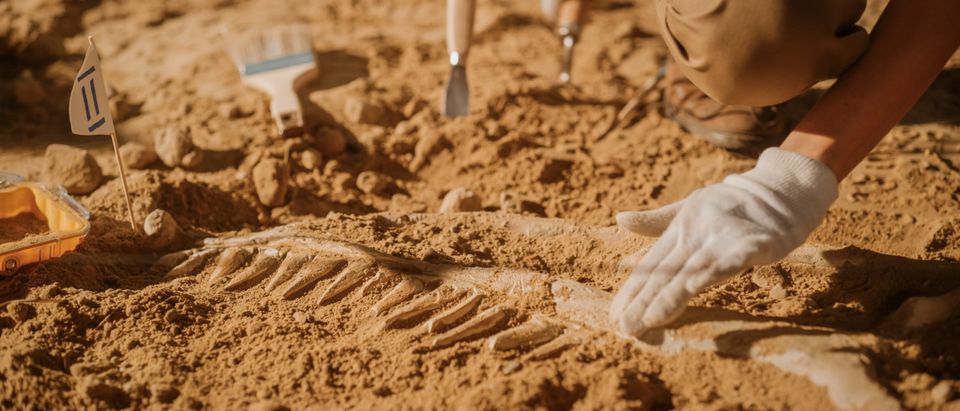Researchers at the Tanis fossil site in North Dakota said they have uncovered the leg of a dinosaur that may have died the day a giant asteroid struck Earth.
The limb, which includes skin, and other fossils are among the many discoveries that have been made at the Tanis site, the BBC reported Wednesday. Scientists believe the dinosaur was killed and subsequently entombed at the site after a massive asteroid impact caused cataclysmic destruction around the world roughly 66 million years ago, the outlet continued.
The dinosaur is thought to be a Thescelosaurus. “It’s from a group that we didn’t have any previous record of what its skin looked like, and it shows very conclusively that these animals were very scaly like lizards. They weren’t feathered like their meat-eating contemporaries,” Professor Paul Barrett from London’s Natural History Museum said after studying the leg.
Scientists may have found the first fossil remains of a dinosaur that died on the very day a huge asteroid collided with the Earth https://t.co/7d4T7tMCid
— BBC Breaking News (@BBCBreaking) April 6, 2022
Scientists said fragments of the asteroid have been identified at the Tanis site in North Dakota, around 2,000 miles away from the Chicxulub crater off the Yucatan Peninsula in Mexico, The New York Times reported. After the enormous, six-mile wide asteroid collided with Earth, there was a mass extinction of dinosaurs, giving way to the growth of mammalian life, the BBC continued.
Fish also discovered at the Tanis site appear to have inhaled the debris from the asteroid impact, which is theorized to have rained down from the sky, the BBC reported. “We’ve got so many details with this site that tell us what happened moment by moment, it’s almost like watching it play out in the movies. You look at the rock column, you look at the fossils there, and it brings you back to that day,” a University of Manchester graduate student told the outlet.
The remains at the site appear to have been rolled together into a mishmash of aquatic organisms and land-based creatures. (RELATED: Stephen Hawking Had One Clear Warning About Aliens. Scientists Are Ignoring It)
“We were able to pull apart the chemistry and identify the composition of that material,” Professor Phil Manning told the BBC of particles found at the North Dakota site. “All the evidence, all of the chemical data, from that study suggests strongly that we’re looking at a piece of the impactor; of the asteroid that ended it for the dinosaurs.”


